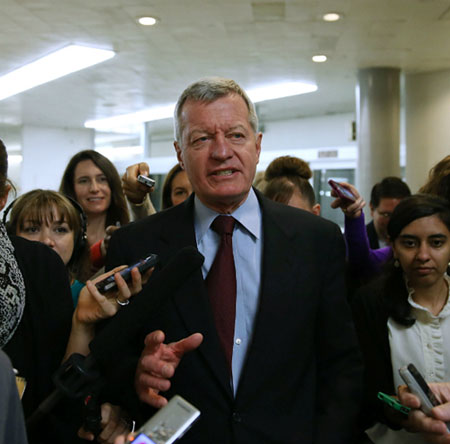
|
With China increasingly demanding to be seen as an equal to the United States, the White House has selected the next steward of its most important, most complicated bilateral relationship. According to media reports, Max Baucus, the influential Democratic senator from Montana, is set to become the next US ambassador to China. While the implications of Baucus' selection are still unclear, here are three potential consequences of a Baucus ambassadorship: 1. It could enable the White House to take more control of the US-China relationship: In his new role as ambassador, Baucus will replace former Commerce Secretary Gary Locke, who will step down in early 2014 and who was preceded by former Utah Governor and presidential candidate John Huntsman. A respected Democratic voice, Baucus is not necessarily a lower profile pick than his predecessors, and he has already met with Chinese President Xi Jinping several times. Where he does differ, especially from Huntsman, is his near total lack of experience in security issues. "It's an interesting [pick] in the sense that security competition with China is heating up and he doesn't have much of a record" on security issues, said Dan Blumenthal, director of Asian studies at the American Enterprise Institute. While Baucus will certainly get up to speed, he's probably less likely than his predecessors to interfere with the White House and the Pentagon on military or political issues. 2. It could improve Beijing's relationship with Congress: Chinese leaders have always been more comfortable dealing with US presidents -- who have a job that's roughly analogous to their own -- than with members of Congress. "They don't really know what to make of Congress, because it's this cacophony of people with many of them influential on different things," said Patrick Chovanec, chief strategist with Silvercrest Asset Management, who formerly taught economics at Tsinghua University in Beijing. Baucus, who's been in the Senate for 35 years, could help smooth over concerns in Congress about Chinese investment in the United States and unfair trade practices against US companies in China. "Having someone who understands that side of the US government and is influential and has those connections," is probably a good thing for the economic side of the relationship, Chovanec said. 3. It's an uncontroversial and unsexy choice for China: Trade is always an easier bilateral issue for Beijing to deal with than military and security matters or questions of human rights. An October 2010 press release from his Senate office titled "Baucus Presses Top Chinese Officials to Address Trade Concerns, Open Market to Montana Beef" was likely not an issue of concern for Chinese officials. Baucus is a soft-spoken Senate dealmaker who was instrumental in ushering President Obama's signature healthcare overhaul through Congress. An introvert rather than a show man, he is less likely to anger Beijing by building a personal relationship with the Chinese people -- which his predecessors made a point of doing. Photos of Locke flying to Beijing coach class, carrying his own luggage, and waiting in line at a Starbucks went viral in China, because of the contrast they highlighted with corrupt Chinese officials. Huntsman famously rode his motorcycle through the streets of Shanghai and would occasionally ride a bicycle to meetings at the Chinese foreign ministry. Baucus will probably keep a lower profile. The news Wednesday night hit China's Internet as most of the country was waking up -- it's 13 hours ahead -- and Chinese news sites are so far just reporting the story without offering any additional commentary. The small number of Chinese netizens who have commented on the appointment have focused largely on Baucus' age. In China, the unofficial retirement age for top politicians is 70, and none of the members of China's Politburo Standing Committee, the seven-member body that rules the country, is over the age of 68. "How has he not retired at 72?" wondered one user of Sina Weibo, China's Twitter. "Why don't they let him rest?" asked another Weibo user. "What will they do if he keels over?" |
中國日益要求和美國平起平坐,在這個形勢下,白宮提名下一任駐華大使以處理最重要、最復雜的雙邊關系——中美關系。媒體報道稱馬克斯·鮑卡斯(Max Baucus)將會成為下一任駐華大使。鮑卡斯來自來自蒙大拿州,是一名有影響力的民主黨參議員。 雖然提名鮑卡斯出任駐華大使的影響尚未可知,但是下文列出了鮑卡斯接任駐華大使后三個可能的好處。 1. 白宮對中美關系將擁有更多控制權 駱家輝(Gary Locke)接替前猶他州州長、總統(tǒng)候選人喬恩·亨茨曼(John Huntsman,中文名為洪博培)出任駐華大使至今,他將于2014年年初離任,屆時鮑卡斯將接替前商務部長駱家輝出任駐華大使。鮑卡斯是一名受人尊敬的民主黨要員,和前幾任駐華大使相比,他并不是默默無聞,他已經多次會見中國國家主席習近平;鮑卡斯真正不同于前幾任駐華大使,尤其是亨茨曼的地方在于,他幾乎完全沒有處理安全問題的經驗。美國企業(yè)研究所亞洲研究(Asian studies at the American Enterprise Institute)主管丹·布盧門撒爾(Dan Blumenthal)稱“提名鮑卡斯是個有趣的(選擇),畢竟中美安全競賽愈演愈烈,而鮑卡斯在安全問題上并沒有什么經驗”。雖然鮑卡斯肯定會惡補安全事務,但是他很有可能不會像前幾任那樣經常干預白宮和五角大樓對軍事和政治問題的處理。 2. 北京與美國國會的關系會有所改善 中國領導人和美國總統(tǒng)打交道總是比和國會更自在,因為美國總統(tǒng)的職能和他們的差不多。“中國領導人真的不知道該怎么看待國會,因為國會內部充滿分歧,很多人能夠影響著不同的事件。”帕特里克·邱伐內克(Patrick Chovanec,中文名為程致宇)說道,他是Silvercrest資產管理集團首席戰(zhàn)略官,曾在北京清華大學教經濟學。鮑卡斯擔任參議院長達35年,他可以減輕國會對中國在美投資和對中國境內針對美國公司的不公平貿易行為的擔憂。邱伐內克稱“找個了解國會,并且在國會具備影響力、人脈廣泛的人當駐華大使”,很有可能促進中美關系經濟層面的發(fā)展。 3. 中國對此或無爭議 相比軍事安全、人權問題,北京處理貿易這個雙邊問題時總是更為得心應手。2012年10月鮑卡斯參議院辦公室發(fā)布題為《鮑卡斯敦促中國高官處理貿易問題,開放市場接納蒙大拿州牛肉》的新聞稿,這一事件并未引起中國官員的不安。鮑卡斯善于言辭,一直致力于促進參議院達成協(xié)議,奧巴馬總統(tǒng)標志性醫(yī)改措施得以在國會通過,他功不可沒。鮑卡斯沉穩(wěn)內斂,不喜出風頭,他如果像前幾任駐華大使強調的那樣,和中國人民建立親切關系,北京將會更樂于接受他。駱家輝坐經濟艙、手提行李和在星巴克排隊照片在中國走紅,是因為他和某些腐敗的中國官員形成了鮮明的對比。眾所周知,洪博培摩托車穿梭于上海的街道,有時還會騎自行車去中國外交部開會。鮑卡斯可能會更低調些。 鮑卡斯或將出任駐華大使的新聞于12月18日,即13小時前出現(xiàn)在中國互聯(lián)網上,當時中國大部分地區(qū)的人剛剛起床,而中國新聞網站到目前為止除了報道這一事件外并未多加評論。那些為數(shù)不多評論此事的網民關注的大多是鮑卡斯的年齡。中國高官非官方的退休年齡為70歲,中國共產黨中央政治局常務委員會七名常委的年齡都未超過68歲。 “鮑卡斯都72歲了怎么還沒退休?”一名新浪微博用戶說道。“為什么不讓他退休呢?”另一名微博用戶問道,“要是他倒下了怎么辦?” (譯者 uamouse 編輯 丹妮) |
